Skype: neodalle-travel
Tel: +86 135 7447 2266
E-mail: sales@visitaroundchina.com
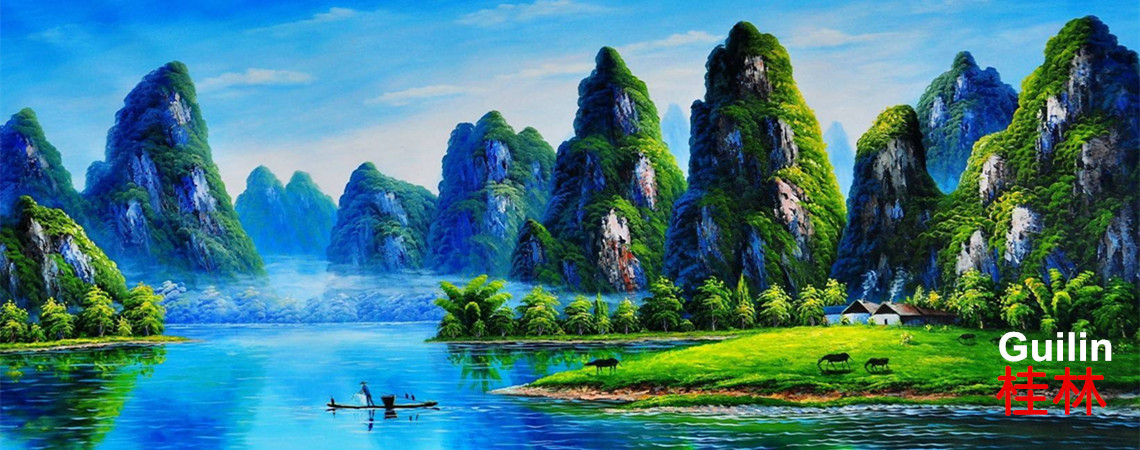
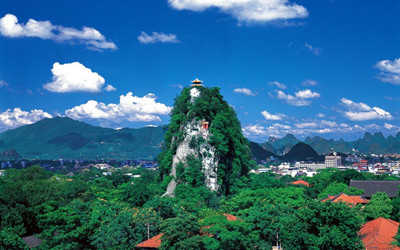 The Prince Jingjiang was the master of the present prince city. He was given the title by his grandfather Zhu Yuanzhang, the creator of Ming Dynasty. It took over 20 years to build his mansion and the history is longer than the Forbidden City in Beijing. In the 257 years from the construction to destruction, all together 14 regional princes in 12 generations have lived in the mansion. In Qing Dynasty (1644-1911), it was served as the imperial examination hall. It was Sun Yat-sen's base camp during his north expedition. At present, it is a part of the campus of Guangxi Normal University.
The Prince Jingjiang was the master of the present prince city. He was given the title by his grandfather Zhu Yuanzhang, the creator of Ming Dynasty. It took over 20 years to build his mansion and the history is longer than the Forbidden City in Beijing. In the 257 years from the construction to destruction, all together 14 regional princes in 12 generations have lived in the mansion. In Qing Dynasty (1644-1911), it was served as the imperial examination hall. It was Sun Yat-sen's base camp during his north expedition. At present, it is a part of the campus of Guangxi Normal University. 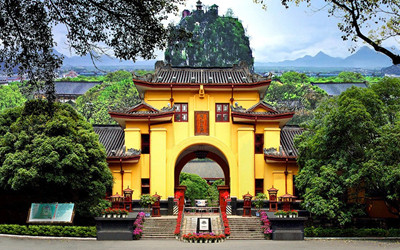 Covering an area of 49 acres (20,000 square meters), it is mainly composed of Chengyun (Be Ordained by Heaven) Gate, Chengyun Hall, Bedchamber, Ancestral Temple, The Altar of the Earth and Harvests, pavilions, terraces and towers. The whole city is a huge building complexes decorated with red walls and yellow tiles, splendid and glorious. Around the Prince City, there is a city wall piled up by strong square green stones. Four city gates are opened in the eastern, western, northern and southern sides, named Tiren (Donghua Gate), Duanli (Zhengyang Gate), Zunyi (Xihua Gate) and Guangzhi (Hougong Gate) respectively. The straight Solitary Beauty Peak stands erect in the city. Yueya (Crescent) Pool is lying at the top of the peak. Move up, visitors can find Xuanwu Pavilion, Kwanyin Hall, Sanke Temple and Sanshen (Three Deities) Ancestral Temple elegantly dotted on the peak.
Covering an area of 49 acres (20,000 square meters), it is mainly composed of Chengyun (Be Ordained by Heaven) Gate, Chengyun Hall, Bedchamber, Ancestral Temple, The Altar of the Earth and Harvests, pavilions, terraces and towers. The whole city is a huge building complexes decorated with red walls and yellow tiles, splendid and glorious. Around the Prince City, there is a city wall piled up by strong square green stones. Four city gates are opened in the eastern, western, northern and southern sides, named Tiren (Donghua Gate), Duanli (Zhengyang Gate), Zunyi (Xihua Gate) and Guangzhi (Hougong Gate) respectively. The straight Solitary Beauty Peak stands erect in the city. Yueya (Crescent) Pool is lying at the top of the peak. Move up, visitors can find Xuanwu Pavilion, Kwanyin Hall, Sanke Temple and Sanshen (Three Deities) Ancestral Temple elegantly dotted on the peak.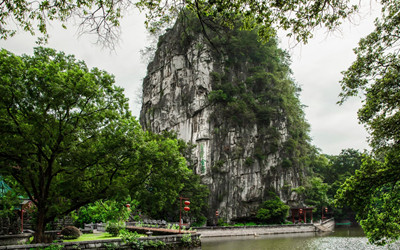 area of 6,100 square meters. Towering 709 feet (216 meters) above the sea level and 66 meters) above the ground, this peak has been a major scenic site in Guilin since ancient times and is renowned as the 'Sky-Supporting Pillar in the South'. Composed of limestone from the shallow sea sediment biochemistry about 0.35 billion years ago, the peak got its name from the famous line in Southern Dynasty (420-589) literature, 'none can surpass this solitary peak in beauty'. When bathed in the dawn sunshine or afterglow, the peak seems to be wearing a purple gown and a golden belt, which is the origin of its other name 'Purple Golden Hill'.
area of 6,100 square meters. Towering 709 feet (216 meters) above the sea level and 66 meters) above the ground, this peak has been a major scenic site in Guilin since ancient times and is renowned as the 'Sky-Supporting Pillar in the South'. Composed of limestone from the shallow sea sediment biochemistry about 0.35 billion years ago, the peak got its name from the famous line in Southern Dynasty (420-589) literature, 'none can surpass this solitary peak in beauty'. When bathed in the dawn sunshine or afterglow, the peak seems to be wearing a purple gown and a golden belt, which is the origin of its other name 'Purple Golden Hill'.A stone stair of 306 steps will lead you to the top of the peak, where you can enjoy the beautiful scenery of Guilin City. Here, you will also find the famous Solitary Beauty Pavilion, which is 23 feet (7 meters) high, has 2 floors and is supported by several red pillars.
There are many peculiar caves in this scenic site. The most famous one is the Dushu (Study) Rock at the east foot of the peak, which looks like a stone room with natural windows and beds inside. It is said that Yan Tingzhi, 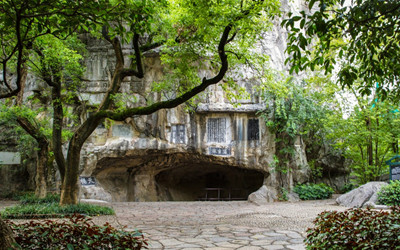 governor of Guilin and also a famous writer, often studied here about 1,500 years ago. At the west foot lies the Taiping (Peace) Rock, which is 9.5 feet (2.9 meters) high and covers an area of 1,507 square feet (140 square meters). This cave looks like a gracious house with a very smooth floor and stalactites of various shapes hanging down from the roof. Flowers are planted in the front of the cave, and statues of Buddha have been erected inside. On the wall of the cave, you can read poets' praise of the cave's exquisite characteristics. The Snow Cave on the other hand, which is located at the north-west foot, is famous for its stalactites that are white as snow.
governor of Guilin and also a famous writer, often studied here about 1,500 years ago. At the west foot lies the Taiping (Peace) Rock, which is 9.5 feet (2.9 meters) high and covers an area of 1,507 square feet (140 square meters). This cave looks like a gracious house with a very smooth floor and stalactites of various shapes hanging down from the roof. Flowers are planted in the front of the cave, and statues of Buddha have been erected inside. On the wall of the cave, you can read poets' praise of the cave's exquisite characteristics. The Snow Cave on the other hand, which is located at the north-west foot, is famous for its stalactites that are white as snow.
Yueya Pond
The renowned Yueya (Crescent) Pond is located at the east foot of the peak. Its name is owing to its distinct crescent shape. The Sun Yat-sen Memorial Tower stands on the bank of the pond, and was established in 1921 to memorize the revolution led by its namesake, Sun Yat-sen. Now, it has been acknowledged as one of the major protected heritages of Guilin City.
Sanyuan Jidi Hall: Located near Zhengyang Gate, Sanyuan Jidi Hall was built for Chen Jichang, one of the 15 candidates that came first in the imperial examinations at all the three levels, which was called "Sanyuan Jidi" in Chinese. Chen Jichang was born in Lingui County in Guilin. His success has won glory for his hometown. In order to memorize him, a memorial gate way carved by a big stone was erected on the main gate of the Prince City, which was the highest honor of the successful people in imperial civil examinations in ancient China.
Zhuangyuan Jidi Hall: "Zhuangyuan" is the title conferred on the candidate who won the first in the highest imperial examination in ancient China. Located on Donghua Gate, Zhuangyuan Jidi Hall was built for Long Qirui, the number one scholar in 1841 in Qing Dynasty. The hall was destroyed in 1900. Today it was reconstructed and opened to visitors.
Bangyan Jidi Hall: "Bangyan" is the second place of the first grade in the highest imperial examinations during Ming and Qing dynasties in ancient China. Located on Xihua Gate, Bangyan Jidi Hall was built for Yu Jianzhang who won this title in Qing Dynasty.
A series of activities is held in these halls. The simulated examination halls of the provincial imperial examination center in Qing Dynasty are set up for visitors to experience the ancient exams. Visitors enter the exam hall, use brush pens and answer the test papers, and luckily they become the successful candidates and are put on the glorious clothes. This is to taste the happiness of ancient candidates when they succeed in the ancient imperial exams.
Travel Tips
Add: in the center of Guilin City,China
Entrance Fee: CNY 130
Opening hours: March 1 to April 30, October 8 to December 7: 07:30 - 18:00;May 1 to October 7: 07:30 - 18:30; December 8 to end of next February: 08:00 - 18:00
Transport: Take bus no.1, 2, 18, 22, 99 or 100 and get off at Lequn Crossing Station in Zhongshan Middle Road Station. Take bus no.2, 9, 10, 11, 14, 18, 21, 25, 28, 30, 203 or 206, and get off at Jiefang Bridge Station in Jiefang East Road.
 Ask Questions ?
Ask Questions ?